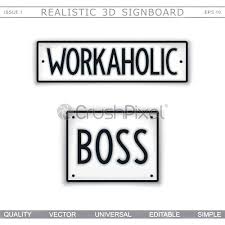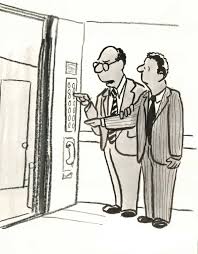Introduction
What little research there is has shown that 5 percent of the world’s working population are workaholics. They call it the problem with no name: the biggest problem of work addiction is that it is not seen as a problem in our society. Being a Workaholic is even rewarded with an honorary status in Western society, rather than recognized as an addiction.
 Hard work oke?
Hard work oke?
Hard work is seen as something positive, not a problem, ”she says. And that’s because we don’t know exactly what we’re talking about when we talk about hard work and work addiction. “Hard work” and “work addiction” are often confused. The dividing line is not clear. Simply because there are no clear figures, because little to no research has been done.
Define the problem
However, we need to define the problem if we want to fix it, especially when your boss is a workaholic. Therefore, in this case I will rely on the few sources that are known, in order to capture as good and as bad as possible that definition of “workaholic” and the difference with “being a hard worker”. The first step to the solution: recognition and naming of “the problem without a name”.
Are you an alcoholic or your boss? Take matters into your own hand and follow my life-changing option at the end of this article.
Differences between workaholic and hard work
Here are the differences between the “workaholic” and “hard worker” at a glance – based on typical recognizable symptoms:
- Workaholics work from self-imposed requirements, whereas hard workers work according to the demands of their boss or function.
- Workaholics can hardly eliminate the habit of working; hard workers do know the difference between “working” and “not working for a while”.
- Workaholics work at the expense of other life activities; hard workers sometimes leave work for a weekly game of tennis or a friend’s birthday.
- Workaholics experience a roller coaster of extremely positive and negative feelings; hard workers have a more stable emotional balance.
- Workaholics work from a sense of need and pressure; hard workers from passion and enthusiasm.
Introduction of the Edward
“That’s Edward, who sits here in the morning before everyone comes in and turns off the light when the cleaner is long gone. Always busy, taking every job he can get his hands on. Great guy, he’s all about business. ” Is Edward just a committed, hardworking boss/employee or is he a workaholic?
Social acceptance
Of all addictions, work is the most socially acceptable. Certainly from the perspective of the shortsighted management. “Edward has a real heart for the business, he is ready for the company day and night.” With this he naturally reaps praise from his bosses. But therein lies the danger. The appreciation from the direct working environment makes the workaholic feel that he is doing well. It is not uncommon for him to be promoted as a reward for his efforts. That reward confirms the wrong behavior.
Example
Where alcoholism is recognized earlier as a problem by the immediate environment, work addiction is more of a latent problem. And yet there is a big difference between a hard worker and a workaholic. Because Edward does have a problem, namely the obsessive, almost irrepressible tendency to work hard and when he does not work, to think about his work. Work is an addiction, which is difficult to get rid of. Especially if the problem is not recognized.
Four symptoms by which you recognize the Edward in your organization:
-
Number of addicts growing
According to researchers, the number of workaholic addicts is growing due to digitization and the 24-hour economy. An important characteristic of work addiction is that someone is constantly restless when he is not working, and feels guilty when he is busy with something else.
That is why the workaholic prefers to check his iPhone or BlackBerry for messages, e-mails or phone calls anywhere, anytime, including during his free time and on weekends. The convenience of the smartphone makes it difficult not to give in to that tendency. Employees who regularly send an email on Saturday evening or Sunday afternoon or send a message at 9 pm are in the danger zone.
 2. Perfectionism
2. Perfectionism
An important personal characteristic of the workaholic is perfectionism. He is a control freak who struggles to give up work. -Someone who constantly criticizes – in his view – the lack of work ethic of his staff or direct colleagues. He prefers to do everything himself, can not delegate at all. “If I don’t do it myself, it won’t work out,” says Edward.
3. Out of time
The direct consequence of this is that the workaholic is always in need of time. He is the one who shouts yes first, draws in all the work and takes on every job – but by no means always gets the job done and is usually busy with everything at the same time.
As a result, he is stressed, rushed, has no time for talk and has no patience to explain anything to a colleague, let alone get involved. The workaholic does not strive to work as efficiently and effectively as possible, he just chases work. Usually the files pile up and the workaholic drowns in the work. If you or his immediate supervisor have no idea what this boss is doing, you may be dealing with a workaholic.
4. It is work only
The workaholic is married to the office and makes long, late hours. You will never hear about activities outside of work, such as hobbies or family outings. When he finally goes home in the evening against his will, he checks his e-mail not long after returning home and maybe even at night. The result is of course that the workaholic is heading for burnout. Health problems, insomnia, fatigue make Edward look tired, irritated and stressed.
This way you can help Edward and the company:
1. Discuss expectations
Just because your boss works consistently for many, many hours a week  doesn’t mean you’re expected to do the same. So instead of incurring it all, sit down with your manager and try to gauge his expectations. Chances are your boss wants to see you focus on core tasks and take the time it takes to accomplish them. And whether you do this in 40 hours versus 50 or 60 may not matter to your manager
doesn’t mean you’re expected to do the same. So instead of incurring it all, sit down with your manager and try to gauge his expectations. Chances are your boss wants to see you focus on core tasks and take the time it takes to accomplish them. And whether you do this in 40 hours versus 50 or 60 may not matter to your manager
2. Set limits
Maybe your manager tends to burn the midnight oil and expects you to do the same. If that doesn’t work for you, express it openly rather than trying to keep up with your boss’s schedule. Otherwise, you run the risk of being burnt out, lowering your performance and copying your manager’s bad side.
Determine how much time you can or want to commit to work and communicate that to your manager. And then be prepared to compromise. The key, however, is to set some sort of limit so that you and your boss don’t fall behind.
3. Learn to manage your time well
Some people who work long hours do so because they are not efficient in managing their time. If you are not willing to clock in 60 hour working weeks – which is understandable – you need to prove to your boss that this is not necessary. Map out your priorities at the beginning of each week, eliminate distractions, and take out projects like the superstar you are. With a little luck, your manager will realize that you are pulling more than just your weight.
4. Complete the necessary steps
 Perhaps you have indicated that you do not want to work 50 or 60 hours a week on a regular basis. But if a work-related emergency strikes or a high-profile project comes up that requires your attention, make sure you are dedicated to it if necessary and prove to your boss that you are willing to go the extra mile when circumstances require. This way, your manager is less likely to chase you into working late just for the sake of it.
Perhaps you have indicated that you do not want to work 50 or 60 hours a week on a regular basis. But if a work-related emergency strikes or a high-profile project comes up that requires your attention, make sure you are dedicated to it if necessary and prove to your boss that you are willing to go the extra mile when circumstances require. This way, your manager is less likely to chase you into working late just for the sake of it.
5. If all else fails, indicate what you have achieved
Maybe your manager has a certain mentality about a lot of work and makes it clear that you are expected to maintain a similar schedule. If so, you have to prove that you are a valuable, responsible employee, even if you don’t take the same number of hours your boss does regularly.
I agree, that all of this, especially the last one, will not be easy. So, what do you do if nothing else works?
My number 1 recommendation
Of course many of you will choose another job, another company, but not everybody can get a new job easily. A perfect alternative could be to keep your job, whilst starting to make money on the side. And you are going to use the internet to do so, with the best support program there is. Interested, then click here to see my full review of the most popular program to date.


I love the way you explained I because many people does not know the difference between a workaholic and a hardworking individual. If you ask me, I would say that workaholics are not smart enough and that’s why they spend almost every hour of their lives working off their ass. At the end, they achieve minimal results.
Interesting take on this topic, the boss not being smart enough to understand what he is doing. This could surely be the case. And yes, workaholics do not tend to work effectively or achieve better results than others. I guess that is why they call it an unhealthy addiction.
Jerry, thank you for this insightful article on the variances between working hard and working too hard! I have always known when enough was enough and recognized when I was overworking myself. Straying into workaholic territory is never fun, and I can tell when what I am doing is having a negative effect on my wellbeing. However, your clear list on how to manage time properly, set my own limits, and recognize when my expectations are too zealous is most memorable. I will keep this list at the forefront of my mind in the future! It will help me maintain my sanity. Excellent advice for diligent workers to follow!
As you said, your body will always tell you when you reach some kind of limit. People get into trouble when they do not listen to these signs, some do not even recognize them. We should never let our health be affected by a bad working situation, in this case a workaholic boss.
Hello Jerry, arrrg… Yeah, you have described my boss perfectly. It’s crazy working with him!
We should set expectations and also establish limits. But for anybodies normal balance work has to be a part of life, not a whole. And don’t get me wrong, I am whiling to work hard during periods of my life on demand. But then go back to normal again.
Sorry to hear about your boss, but at least now you know that this can happen. Now you also know that something can be done about it. There is nothing wrong with working very hard sometimes, but only some people can do that for extended periods of time. Above all we should know ourselves and act accordingly.
This is really great to see here and I must say I truly appreciate this post here. To be honest, I four d this post quite a blessing. Dealing with bosses can really be killing and tiring especially when they have decided not to keep calm and allow a normal floe of work. A workholic would always look for a way to add up to the work for one and that’s why it pays to deal with them consciously. This is good and thanks
A workaholic boss can be a real pain in the ass if he expects the same from his staff. He should however realize that not everybody is the same, not everybody is married to their job. People should take action, lest they fall into this trap.